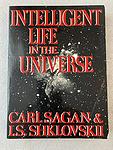Carl Sagan
Carl Sagan was an acclaimed astronomer, cosmologist, astrophysicist, astrobiologist, author, and science communicator in astronomy and other natural sciences. He is best known for his work as a science popularizer and communicator. His best-known scientific contribution is research on extraterrestrial life, including experimental demonstration of the production of amino acids from basic chemicals by radiation. Sagan published more than 600 scientific papers and articles and was author, co-author, or editor of more than 20 books. He also gained widespread fame for his 1980 television series 'Cosmos: A Personal Voyage', which he narrated and co-wrote. Sagan also advocated for nuclear disarmament and was a staunch supporter of skeptical inquiry and the scientific method.
Books
This list of books are ONLY the books that have been ranked on the lists that are aggregated on this site. This is not a comprehensive list of all books by this author.
-
1. Contact
The book is a science fiction novel that explores the concept of human contact with extraterrestrial life. The protagonist, a scientist, deciphers a radio signal from a distant star system that contains plans for a complex machine. After building and entering the machine, she and her team are transported to a distant star system where they meet an alien species. The novel delves into philosophical discussions about religion, science, and the nature of human existence.
-
2. Cosmos
This landmark book is a majestic cosmic tour that delves into the nature of the universe, exploring a vast array of topics including the science of space and time, the origins of life, and the human quest for understanding. It intertwines science and philosophy, taking readers on a journey through the history of astronomy, the development of the scientific method, and the incredible vastness of the cosmos. The narrative is infused with a sense of wonder and awe at the complexity and beauty of the universe, as well as a thoughtful consideration of the place of humanity within it. The work is a celebration of human curiosity and a powerful advocate for the importance of science and education in helping us to understand our world and our place in the cosmos.
-
3. Intelligent Life in the Universe
"Intelligent Life in the Universe" is a comprehensive exploration into the possibility of extraterrestrial life. The book delves into a variety of scientific disciplines including astronomy, biology, chemistry, and physics to provide a detailed examination of the conditions necessary for life to exist. The author further investigates the potential for intelligent life on other planets, potential methods of communication with these beings, and the implications such discoveries would have on our understanding of the universe.
-
4. The Cosmic Connection
In this thought-provoking work, the author explores the vastness of the universe and humanity's place within it, delving into the possibility of extraterrestrial life and the implications of such discoveries. The book combines scientific rigor with poetic wonder, discussing topics ranging from the origins of life to the future of space exploration. The author's reflections on our cosmic connections emphasize the unity of all life on Earth and the importance of our quest to understand the cosmos, urging us to continue our search for knowledge and to ponder our role in the grand tapestry of the universe.
-
5. The Dragons of Eden
This book explores the fascinating topic of the evolution of human intelligence, from the big bang to the present day. The author uses a blend of psychology, anthropology, and biology to propose theories on how the human brain has evolved over time. The book also delves into the role of reptilian and mammalian brains in human evolution, while drawing parallels between the development of the brain and the cosmos. The author's theories are supported by a wide range of scientific evidence, making this a compelling read for anyone interested in the evolution of intelligence.




